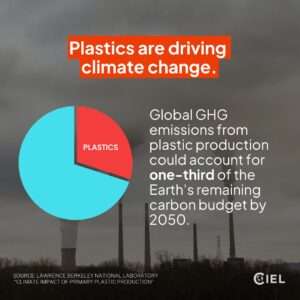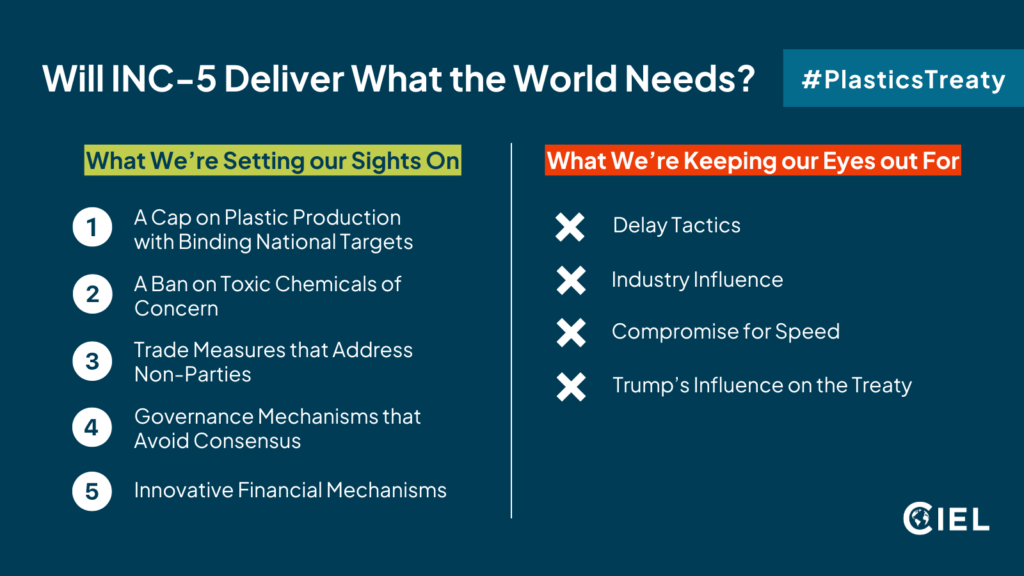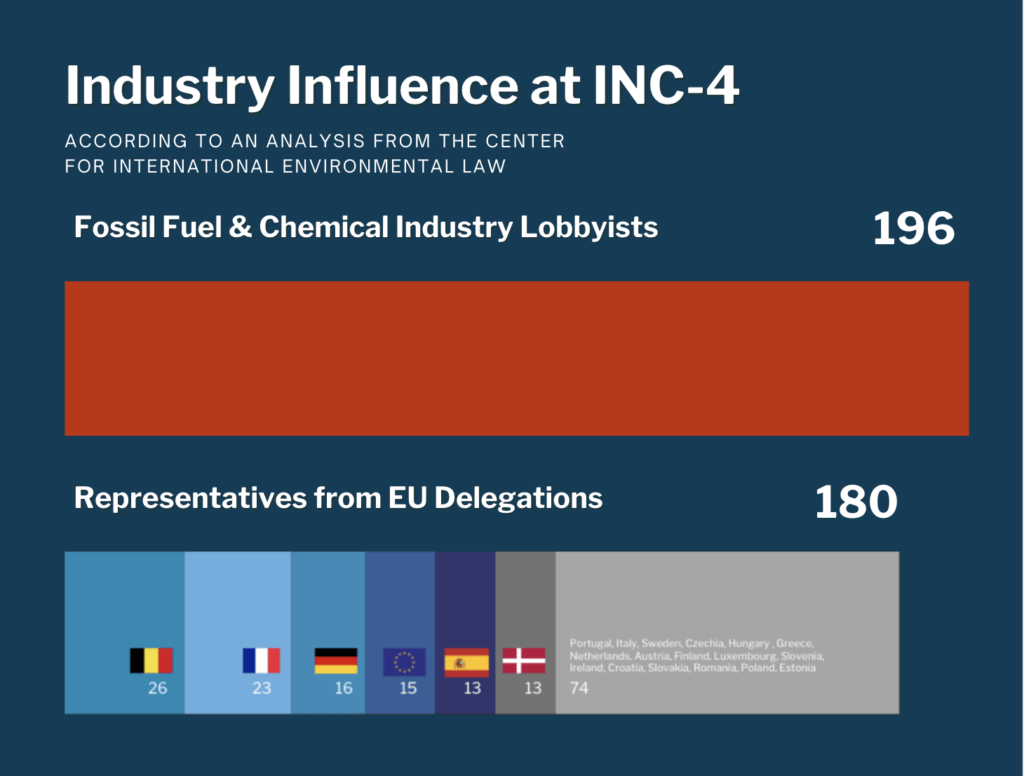Printed November 20, 2024
By Andrés Del Castillo, Senior Lawyer on the Heart for Worldwide Environmental Regulation, and Lindsey Jurca Durland, Marketing campaign Specialist on the Heart for Worldwide Environmental Regulation
The stakes couldn’t be increased as we enter the closing scheduled spherical of plastics treaty negotiations. From November 25 to December 1, United Nations Member States will convene in Busan, Republic of Korea — will they ship a treaty that matches the urgency of the plastics disaster?
What’s at Stake
The worldwide plastics disaster poses an escalating menace to the surroundings, public well being, and the economic system. At the moment, 99 % of plastics are derived from fossil fuels — the principle driver of local weather change — and manufacturing is on observe to triple by 2050, accounting for 20 % of world oil demand throughout the subsequent tw o many years. This surge in plastic manufacturing may deplete a staggering one-third of the Earth’s remaining carbon funds, significantly jeopardizing efforts to restrict world warming to 1.5°C.
o many years. This surge in plastic manufacturing may deplete a staggering one-third of the Earth’s remaining carbon funds, significantly jeopardizing efforts to restrict world warming to 1.5°C.
In the meantime, petrochemical and plastic markets face mounting financial challenges as overcapacity worsens, sustainable investments achieve momentum, and regulatory pressures tighten. Regardless of stagnant demand and an oversaturated market, greater than 1,400 new plastic manufacturing initiatives are deliberate by 2027. With traditionally low revenue margins and warnings from credit standing companies, economists have cautioned that increasing fossil-fuel-based plastic manufacturing is each reckless and economically shortsighted. The Institute for Power Economics and Monetary Evaluation (IEEFA) urges a manufacturing cap to handle market imbalances and mitigate dangers to the surroundings and the economic system.
A significant world plastics treaty should cap manufacturing, stabilize market imbalances, align efforts with local weather objectives, tackle inequities, and curb the widespread devastation of plastic air pollution, together with greenhouse gasoline emissions.
The place Do Negotiators Start?
Negotiators will arrive in Busan with practically 70 dizzying pages of draft textual content and greater than 3,700 unresolved brackets — a sign that there’s a lot divergence on what the treaty ought to or shouldn’t embody. Whereas INC Chair Luis Vayas has proposed a “non-paper” to streamline discussions, critics, together with CIEL, warn that because it stands, it leaves key treaty provisions with out prompt textual content and units the stage for a weak and ineffective treaty. CIEL and Break Free From Plastic have put collectively a streamlined comparability of the non-paper and draft treaty textual content to tell and information the negotiations.
Important Components of an Efficient Plastics Treaty

As negotiations unfold, listed below are the important thing elements a profitable treaty should embody:
A Cap on World Plastic Manufacturing with Binding Nationwide Targets
Plastic’s poisonous impacts permeate each stage of its life cycle. With plastic recycling charges beneath 10 %, downstream measures are wholly insufficient to handle this disaster. The answer should start on the supply: we’d like a treaty that caps plastic manufacturing. To align with world local weather objectives, CIEL recommends a minimal 70 % discount in plastic manufacturing by 2050, utilizing 2019 as a baseline.
A treaty that fails to restrict plastic manufacturing at its supply is not going to solely fall in need of its mandate to finish plastic air pollution — it should fail humanity at a essential juncture. To meaningfully tackle this disaster, a worldwide discount goal should be paired with bold, binding nationwide commitments.
A treaty with a worldwide manufacturing goal however no binding nationwide obligations dangers changing into one other ‘Paris-style’ settlement — providing guarantees whereas delaying actual motion. Suspending choices on nationwide obligations is a harmful gamble, with no assure of success. The primary and most crucial step towards significant reductions is stopping exponential plastic manufacturing development. That’s why the treaty should mandate nationwide measures to halt the growth of manufacturing capability, notably for high-volume plastics driving the disaster.
Bans on Chemical substances of Concern
Of the 16,000 chemical compounds utilized in plastics, greater than 4,200 are recognized to pose critical well being and environmental hazards and dangers and have been linked to miscarriage, weight problems, diabetes, most cancers, and extra. Almost 10,000 of them lack sufficient information, posing unknown risks. Following the recommendation of main scientists, the treaty should undertake the precautionary precept, globally banning total lessons of hazardous chemical compounds, mandating transparency, and prioritizing human and environmental security.
Commerce Measures
Plastics are a transboundary difficulty. Feedstocks, merchandise, and waste stream throughout world markets, usually circumventing rules. The treaty should set up enforceable measures for monitoring and managing commerce, together with guidelines for non-party nations that don’t ratify, to forestall loopholes and keep treaty efficacy.
Sturdy Governance Mechanisms
After the treaty textual content is finalized and entered into power, a Convention of the Events (COP) will convene to make sure the treaty’s implementation, monitor progress, and tackle rising points. Future decision-making should keep away from the pitfalls of consensus voting, which dangers stalling progress. A dynamic treaty should empower common COPs to swiftly tackle rising points and guarantee long-term success by establishing the likelihood for certified majority voting when consensus can’t be reached.
Monetary Mechanisms The treaty should set up a devoted monetary mechanism to assist the achievement of its aims, with a selected concentrate on helping low- and middle-income nations. Member States ought to embrace modern funding options, resembling implementing a globally coordinated charge on major polymer manufacturing.
Challenges in Busan
Delay Ways
Because the INCs have already proven, Member States could try to dilute ambition and derail progress. These ways can embody a flood of procedural questions, denial of scientific consensus, claims of information gaps, reopening agreed-upon textual content, and requesting extra info to delay decision-making.
Trade Affect
Fossil gas and chemical trade lobbyists have infiltrated earlier negotiations. In accordance with an evaluation by CIEL, the variety of lobbyists at INC-4 outnumbered European Union delegates. Strict battle of curiosity insurance policies and transparency measures are essential to make sure that the treaty’s implementation is protected against the vested pursuits of those industries.

Compromise for Velocity
As negotiators really feel the stress of a ticking clock, they might be tempted to reduce ambition, sideline essential subjects, or undertake a weak, non-binding framework. Negotiators should stability urgency with ambition to make sure a treaty that meets its mandate.
Trump’s Affect on the Treaty
INC-5 negotiations come simply weeks after Trump’s re-election, elevating considerations about how this will likely form the US delegation’s stance in Busan. Trump has made clear his alignment with an trade that not solely undermines local weather imperatives however is dealing with financial decline.
Regardless of this, most nations have proven a powerful dedication to shifting away from poisonous, polluting plastics. The US negotiating group stays below the Biden-Harris administration’s directive and world negotiators should not let the current election derail world progress. If the US fails to advocate for an bold treaty, they danger being left behind as different nations forge the way in which.
What the World Wants from INC-5
The ultimate plastics treaty should ship greater than lofty objectives. We name on negotiators to ship actual, enforceable options that:
Cap and scale back plastic manufacturing to curb plastic air pollution at its supply.
Ban hazardous chemical compounds to guard human and environmental well being.
Set up clear commerce and governance measures for efficacy.
Decide to binding, bold nationwide targets that align with human rights and local weather objectives.
The Second of Reality
The world can’t afford a weak or voluntary treaty that prioritizes trade pursuits over human and planetary well being. Leaders in Busan should rise to the event and ship the daring, binding settlement we have to deal with the plastics disaster.
With no strong treaty, we danger locking in many years of escalating plastic manufacturing, worsening local weather impacts, and irreparable hurt to ecosystems and communities worldwide. The time for incremental steps is over. It’s now or by no means.
The world is watching. Will INC-5 ship the treaty we deserve?







![[Now available] Chronology of Practice: Chinese Practice in Private International Law in 2023 By Prof. HE Qisheng](https://i3.wp.com/conflictoflaws.net/News/2024/12/Capture-decran-2024-12-20-091629-300x298.png?w=350&resize=350,250&ssl=1)







![[Now available] Chronology of Practice: Chinese Practice in Private International Law in 2023 By Prof. HE Qisheng](https://i3.wp.com/conflictoflaws.net/News/2024/12/Capture-decran-2024-12-20-091629-300x298.png?w=120&resize=120,86&ssl=1)






